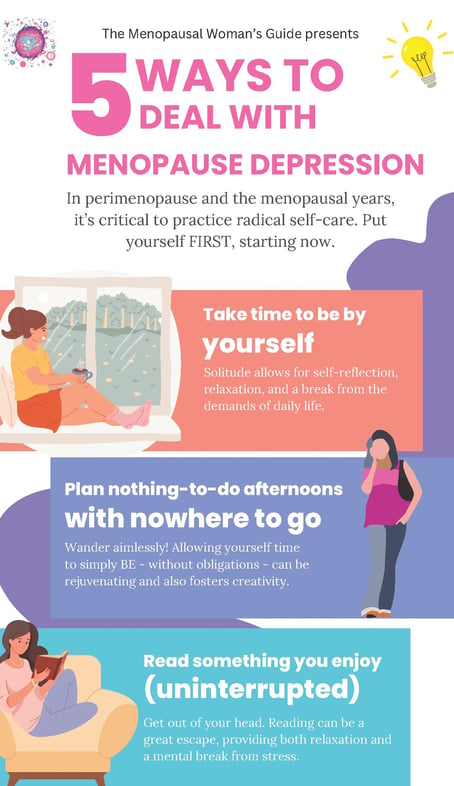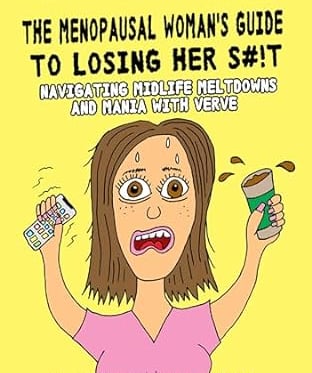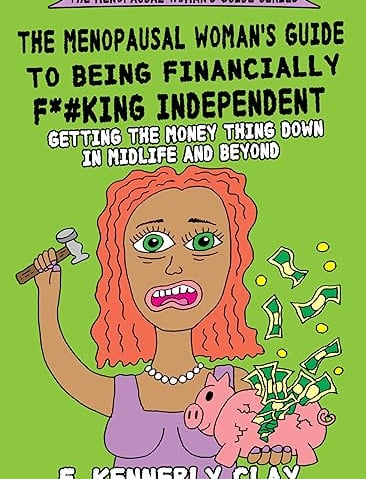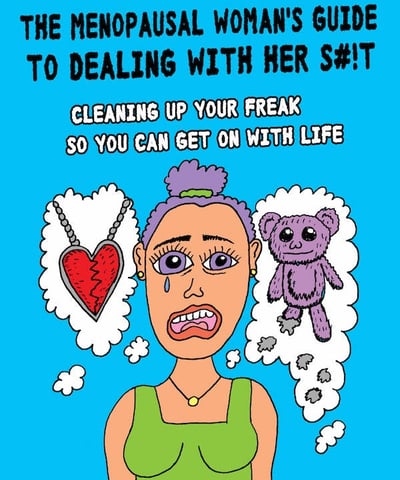
Depression in Menopause
Is depression in menopause kicking your butt? We totally get it. Find out what's happening with your mental health and how to get through this turbulent time.
The dark side of menopause and mental health
If you thought dealing with PMS was fun, menopause is here to laugh in your face. Now you get to trade in your monthly cycle for a shitshow of hot flashes, night sweats, and mood swings. But among these unpredictable symptoms, one of the most insidious is depression.
Yes, depression in menopause is a real thing, and it’s time we talked about it. For those who need a refresher, menopause is the time in a woman's life when menstrual periods stop permanently, signaling the end of the reproductive years. This typically happens between the ages of 45 and 55, but perimenopause—the transitional phase leading up to menopause—can start much earlier. Perimenopause feels like a long, annoying buildup to the main event, marked by fluctuating hormone levels that are critical players in menopause and mental health.
Hormones messing with your mood
Estrogen and progesterone, those famous female hormones, are the primary culprits behind the mood swings that accompany menopause. Estrogen, in particular, has a profound effect on serotonin and dopamine, the brain’s feel-good chemicals. When estrogen levels drop, so do serotonin and dopamine, which can lead to mood disorders like depression.
In other words, if you’re feeling particularly shitty, your hormones might be to blame.
If you or someone you know is in crisis, please call 988, the Suicide & Crisis Lifeline in the United States.
Understanding depression in menopause
Depression during menopause isn’t just a case of feeling down or having a bad day. It’s a serious mental health condition that can have a significant impact on your quality of life. Symptoms of depression in menopause can include:
Persistent sadness
Loss of interest in activities you once enjoyed
Changes in appetite or weight
Sleep disturbances
Fatigue
Feelings of worthlessness or guilt
Difficulty concentrating
Thoughts of death or suicide
If this sounds all too familiar, you’re not alone—and it’s important to seek help.
The mental health 'mark' in menopause
Unfortunately, depression can still carry a heavy stigma, and many women feel ashamed or embarrassed to admit they’re struggling. Society has yet to grasp the extent to which mental health issues can arise in menopause and there's limited support in the workplace and in public dialogue. While this is starting to shift, thanks to Hollywood's perimenopausal women like Drew Barrymore and Kelly Ripa getting loud about the symptoms, you might still find yourself in the shadows and feeling alone in all this. It's crucial to break the silence and seek support if you’re experiencing depression in menopause.
5 ways to deal with menopause depression
Get the infographic on the importance of self-care in menopause and five creative ways to deal with menopause depression.


The perfect shitstorm for depression in menopause
Hormonal hot mess
As mentioned earlier, the hormonal fluctuations that accompany menopause can trigger depression. But it’s not just estrogen and progesterone; other hormones like testosterone and cortisol can also play a role. Testosterone levels decline during menopause (also known as low T), which can lead to a decrease in energy and libido, contributing to feelings of depression. Low T is also a factor in brain fag and mojo, like when your getup and go just gotup and went, you know what I mean? Once I started addressing low testosterone, the fog lifted and I got some spring back in my step.
Meanwhile, increased cortisol levels due to stress can exacerbate symptoms of anxiety and depression. During perimenopause (and sometimes still to this day), I would have the experience of wanting jump out of my skin. I was agitated, so out of sorts, so much in fight or flight mode, I couldn't handle being in my own body. Can you relate?
Stress: The bullshit of life
Menopause often coincides with other significant life changes, creating a perfect shitstorm for depression. You might be dealing with an empty nest, aging parents, career transitions, or relationship issues—all of which can add to your stress levels. These stressors, combined with hormonal changes, can be overwhelming and even debilitating. At best, you probably feel like you're going completely fucking crazy.
Physical health and the mind-body disconnection
Physical health issues that often arise during menopause can also contribute to depression. Some women start having medical conditions like for the first time in their lives. Osteoporosis, cardiovascular disease, and chronic pain can take a toll on your mental health. Many women start having more aches and pains (joint pain, for example), along with thinning hair and weird stuff showing up in the body or on the skin. Plus, the physical symptoms of menopause—hot flashes, night sweats, and insomnia—can disrupt your sleep and leave you feeling exhausted and irritable. It’s hard to maintain a positive outlook when you’re constantly battling physical discomfort.
For me, it was chronic pain due to a car accident that coincided with the arrival of perimenopause. I was dealing with pain which led to low energy - when I was already combatting major perimenopausal fatigue - which led to low mood which led to depression. And then the pain cycle would trigger the whole thing all over again. Depression, anxiety and pain are closely related and can be especially crippling in menopause.
"Falling estrogen and progesterone levels can trigger mood swings that make you less able to cope with things you’d normally let roll off your back. For some, these hormonal dips can set off a depressive episode, especially for those who’ve gone through major depression in the past." - Cleveland Clinic
Navigating depression in menopause


Acknowledge your feelings
The first step in dealing with depression in menopause is acknowledging your feelings. It’s okay to not be okay. Menopause is a major life transition, and it’s normal to feel overwhelmed. Give yourself permission to feel what you’re feeling without judgment. Sometimes, just admitting that you’re struggling can be a huge relief.
Seek professional help
If you’re experiencing symptoms of menopause depression, it’s important to seek professional help. A healthcare provider can help you navigate this challenging time and develop a treatment plan that’s right for you. This might include therapy, medication, or a combination of both. Cognitive-behavioral therapy (CBT) can be particularly effective in helping you change negative thought patterns and develop coping strategies. The point being: Don't wait until you completely lose your shit to start getting help and taking care of yourself. It's much harder to deal with a total menopausal meltdown than it is to take some self-care and preventive measures.
My own mental health journey included the following remedies:
A mental health therapist
A cocktail of antidepressants
Every book and article I could find on perimenopausal symptoms
Conversations with my girlfriends
Energy and spiritual work
Disco dancing in my living room
Pain management by way of Pilates, nature walks, and occasional painkillers
Followed by the ultimate relief: ketamine therapy for depression
Depression sounds "simple" but it can be really fucking complicated to figure out the exact right balance of treatments, therapies, self-care and personal growth and exploration needed to get you through it. And what works in the beginning, might not be working midway. Keep seeking out ways to heal yourself.
Consider hormone replacement therapy (HRT)
Hormone replacement therapy (HRT) can be a game-changer for some women experiencing depression in menopause. By restoring hormone levels, HRT can help alleviate both physical and mental symptoms. Bioidentical hormone replacement therapy (BHRT) is also an option for some. BHRT is a treatment that uses hormones that are chemically identical to those the human body naturally produces. The hormones used in BHRT are derived from plant sources and are designed to match the molecular structure of the hormones produced by the body. Common hormones used in BHRT include estrogen, progesterone, and testosterone. BHRT comes in various forms, including:
Pills
Patches
Creams and gels
Injections
Pellets implanted under the skin
The goal of BHRT is to restore hormonal balance and alleviate symptoms such as hot flashes, night sweats, mood swings, weight gain, and loss of libido. The safety and efficacy of BHRT are topics of ongoing research and debate. To help determine whether BHRT is right for you, consult with an integrative and functional medicine doctor who is attuned to the needs of menopausal women and has expertise in this area.
My own comfort level with BHRT came from reading Suzanne Sommers' I'm Too Young for This - The Natural Hormone Solution to Enjoy Perimenopause and a personal recommendation from a friend who'd been getting BHRT treatments for years. Within a week or two of starting BHRT (for me, a pellet in the butt every three to four months), the dense brain fog started to clear and I got a little spring in my step. The deadening fatigue lifted and I felt functional again. Do yourself a favor and explore the benefits of functional medicine in menopause.
Small lifestyle changes, big impact
Sometimes, small changes can make a big difference in managing depression in menopause. Regular exercise, a balanced diet, and good sleep hygiene can all help improve your mood and overall well-being. Exercise, in particular, is a natural mood booster, releasing endorphins that can help combat depression. Even a daily walk can make a difference.
Consider this not just "having to get some exercise" but rather a gift you give to yourself: time to decompress, reflect, energize. It's self-care, and now is the time to get really good at it. Identify simple, easy ways for you to give to yourself - and be sure to get outside and in touch with nature. It will nurture you.
Mindfulness and relaxation techniques
Mindfulness and relaxation techniques, such as meditation, deep breathing exercises, and yoga, can help you manage stress and stay grounded. These practices can help you become more aware of your thoughts and feelings, allowing you to respond to them in a more balanced way. Apps like Insight Timer, Headspace and Calm offer guided meditations that can fit into even the busiest schedules.
Here are some simple mindfulness methods to practice:
Deep breathing - Inhale deeply through the nose, hold for a few seconds, and exhale slowly through the mouth.
Progressive muscle relaxation - Tense and relax each muscle group, starting from the toes and moving upwards.
Mindfulness meditation - Focus on the present moment, observing thoughts and sensations without judgment.
Visualization - Imagine a peaceful scene, engaging all senses to enhance the experience.
Yoga - Combine physical postures, breathing exercises, and meditation to promote relaxation.
Body scan - Mentally scan the body for tension, releasing it as you go.
Build a support network
Having a strong support network can make a world of difference when dealing with depression in menopause. Friends, family, and menopause support groups can provide a safe space to share your experiences and feel understood. Surround yourself with people who lift you up and can offer empathy and encouragement. Remember, you’re not alone in this journey even though it feels like it most of the time.
Life stressors, combined with hormonal changes, can be overwhelming and even debilitating. At best, you probably feel like you're going completely fucking crazy.
Coping with menopause depression


Self-care on steroids
Self-care isn’t just a trendy buzzword; it’s a vital component of managing depression in menopause. Engage in activities that bring you joy and relaxation. Whether it’s taking a bubble bath, reading a good book, or gardening, make time for yourself. Your mental health is just as important as your physical health, so don’t neglect it.
Find your passion
Rediscovering old hobbies or finding new ones can provide a sense of purpose and fulfillment during menopause. Whether it’s painting, cooking, hiking, or knitting, find something that sparks joy and makes you feel alive. Engaging in activities you’re passionate about can help distract you from negative thoughts and boost your mood.
In my perimenopausal years, I started studying ikebana, the Japanese art of flower arranging. I found quiet and solace in between the stems and enjoyed the creative expression it allowed me. I had never had a "hobby" before perimenopause. I like to write and I like to travel. But there was no single activity that I considered a hobby for myself. Flower arranging became my "thing" for awhile and I still love to surround myself with the beauty of flowers. The point being: Get ideas online or ask others what their hobbies and passions are. Maybe it'll spark something for you.
Laugh your menopausal ass off
Laughter truly is great medicine. Find humor in the little things and don’t take yourself too seriously. Watch a funny movie (or stand-up comedy for hold-your-gut-laugh-out-loud humor), read a funny book, or spend time with friends who make you laugh. Laughter can help reduce stress, improve your mood, and remind you that life isn’t all doom and gloom.
Journaling: Write it out
Writing can be a powerful tool for processing emotions and gaining clarity. Keep a journal to document your thoughts and feelings. Writing about your experiences can help you make sense of them and identify patterns or triggers. Plus, it’s a great way to release pent-up emotions and gain a sense of control over your mental health in menopause.
Practice gratitude
Gratitude is a powerful antidote to depression. Taking time each day to reflect on the things you’re grateful for can help shift your focus from what’s wrong to what’s right in your life. Keep a gratitude journal and write down three things you’re thankful for each day. Or if you're not feeling particularly grateful, just reach for "what's right." This simple practice can help you cultivate a more positive outlook.
If journaling feels like one more fucking thing you have to do, try a gratitude jar. Keep a jar and small slips of paper handy. Each day, write down one thing you're grateful for - or just glad about - and place it in the jar. Over time, you’ll accumulate a collection of positive memories and blessings. When you need a boost, read through your gratitude slips to remind yourself of the good things in your life.
Volunteer and give back
Helping others can provide a sense of purpose and fulfillment. Volunteering your time and skills can boost your self-esteem and provide a distraction from your own struggles. Plus, knowing you’ve made a difference in someone else’s life can be incredibly rewarding.
Here are a few simple ideas to get your volunteer wheels turning (keeping in mind, of course, that it's probably not the best time to pile a whole bunch of responsibility on your plate). Everything in moderation. Take it slow and easy. Try things out. See how they fit.
Community clean-up: Spend a few hours picking up litter in your local park or neighborhood.
Food bank: Help sort and distribute food to those in need at a local food bank.
Animal shelter: Volunteer to walk dogs, clean kennels, or assist with adoption events.
Tutoring: Offer your skills to help students with their homework or teach adults new skills.
Elderly assistance: Visit a nursing home to chat with residents, read to them, or help with activities.
Charity runs/events: Participate in or help organize local charity runs, walks, or fundraising events.
Library help: Assist with organizing books, reading to children, or helping with events at your local library.
Meal delivery: Deliver meals to homebound individuals through programs like Meals on Wheels.
If you find that giving to others is too depleting, pull back. Be careful not to overextend yourself to the point of feeling stressed. Just look for ways to make yourself feel good.
Depression sounds "simple" but it can be really fucking complicated to figure out the exact right balance of treatments, therapies, self-care and personal growth and exploration needed to get you through it.
Living well with depression in menopause
Acceptance: The key to peace
Accepting that menopause is a natural part of life can help you make peace with the changes you’re experiencing. This doesn’t mean resigning yourself to misery, but rather accepting the transition and finding ways to navigate it with grace and resilience. Acceptance can be empowering and liberating, allowing you to focus on what you can control. Keep in mind that conversely, what you resist will persist. Being annoyed about menopausal depression and all the changes that have come your way will only make you feel more frustrated by it all.
Educate yourself
Knowledge is power. Educate yourself about menopause and depression so you can better understand what you’re going through. Read books, attend workshops, and talk to your healthcare provider. The more you know, the better equipped you’ll be to manage your symptoms and advocate for yourself.
Stay connected
Isolation can exacerbate depression, so it’s important to stay connected with others, even if you feel like being alone and away from the world. Make an effort to maintain your social connections, even when you don’t feel like it. Reach out to friends and family, join support groups, and engage in social activities. Human connection is a powerful antidote to loneliness and can provide a much-needed sense of belonging.
Set realistic goals
Setting realistic goals can help you maintain a sense of purpose and achievement. Break larger tasks into smaller, manageable steps and celebrate your progress along the way. Don’t be too hard on yourself if you don’t accomplish everything on your list. Focus on what you have achieved and keep moving forward.
One type of goal that always delivers for me is planning a trip. I love to travel so having something to always look forward to fuels my spirit. Maybe it's the same for you.
Be kind to yourself
Above all, be kind to yourself. Menopause is a challenging time, and it’s important to treat yourself with compassion and understanding. Give yourself grace when things don’t go as planned and celebrate your victories, no matter how small. Remember, you’re doing the best you can, and there's no particular way things "should" be. They just are.
If you're not feeling particularly grateful, just reach for "what's right." This simple practice can help you cultivate a more positive outlook.
Being okay with the journey
Depression in menopause is a serious and often overlooked aspect of this life transition. The hormonal upheaval, combined with life stressors and physical health changes, can create a perfect storm for depression. But by acknowledging your feelings, seeking professional help, making lifestyle changes, and building a strong support network, you can navigate this challenging time with resilience and grace.
Remember that women have gone through menopause for eons before you. Most come out the other side stronger and wiser. Be at ease with the transition - much as you hate going through it or wish it wasn't happening. And be sure to educate yourself while taking proactive steps to manage your mental health. With the right tools and support, you can conquer depression in menopause and emerge with a renewed sense of purpose and vitality.
Remember: You’re bound to lose your shit, but you’re likely to get it back again at some point.
Books for women who are losing it in menopause
Mental Health
Losing your mind in peri/menopause?
The menopausal woman's guide series
Financial Health
Had enough of financial insanity?
Personal Growth
Triggers? Old stuff kicking up?
Related topics
Explore helpful articles, tips, and advice for women who are losing their shit in menopause.
Community
Stay Connected
© 2024. Eclectic Content, Inc. All rights reserved.






